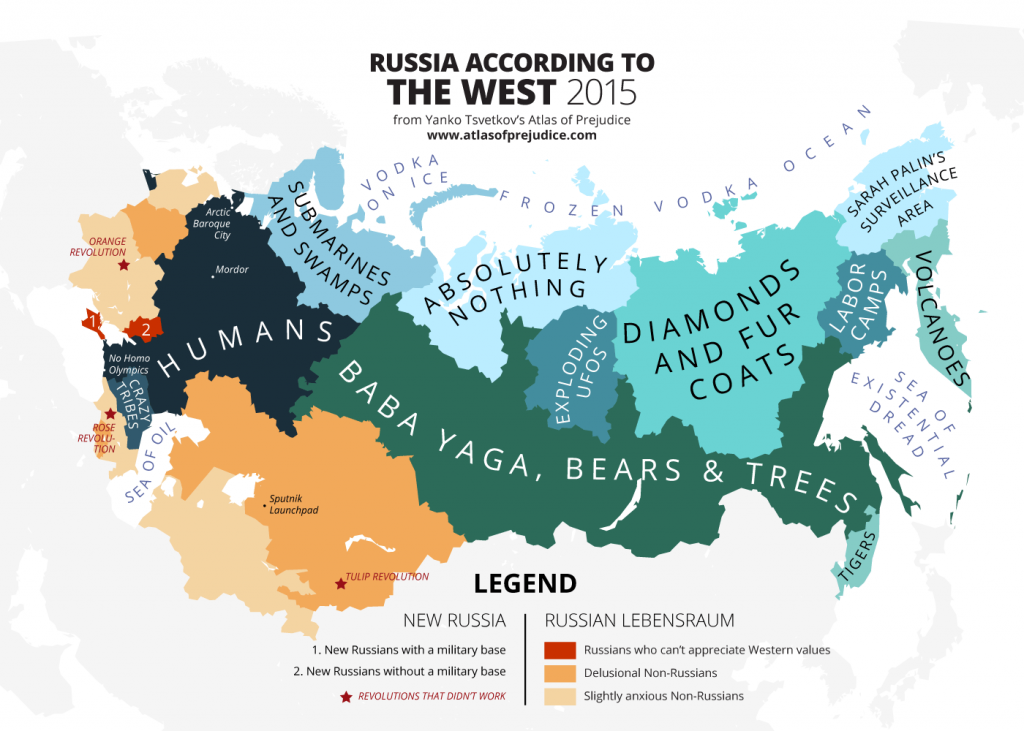
As the philosopher Plato (428-348 BCE) and the statesman/historian Polybius (200-118 BCE) knew very well, empires come and go. The Babylonian Empire rose and declined. The Persian Empire rose and declined. Alexander’s Macedonian Empire rose and broke up. By the first century BCE the idea that the Roman Empire, too, would one day decline and fall had become commonplace among its educated inhabitants; as one of them, the Roman historian Livy, wrote, the empire was “struggling with its own greatness”. However, there was no agreement as to when this would happen, let alone how.
Over time many different reasons were invented to explain the decline. Speaking of the Graeco-Roman world, perhaps the most common one was the idea that power and prosperity undermine themselves. The more powerful and prosperous an empire, the softer its citizens and the more addicted to wine, song and women and the less inclined to serve, fight and die they became. During the late Roman Empire this reached the point where soldiers mutilated themselves so as to avoid military service and, if brought to justice, might be burnt alive. Sooner or later the point was reached when those in charge had to turn to foreigners in order to defend the empire against its enemies. Sooner or later those foreigners would become a liability, either because they did not fight hard enough or because they turned against their employers.
Since then many other explanations have been put forward. Sin or, in most non-Abrahamic religions, insufficient attention to the kind of religious rituals that make the world tick, caused God to turn His face away. Civil war, often the result of religious differences or excessive taxation or both, caused public order to break down. Egoistically-minded people, especially those belonging to the upper classes, refused to have children and raise them, preferring to use contraceptives or engage in homosexual sex. “Imperial overstretch,” a term made popular by the historian Paul Kennedy in his 1987 volume, The Rise and Decline of the Great Powers, created a situation whereby the Empire’s resources, material and human, were inadequate to support its commitments. Excessive use and abuse of natural resources caused the deforestation and desertification, not to say poisoning, of entire districts, even countries. Natural disasters increased in frequency and severity. Often more than one cause, or set of causes, were involved—all mingled with each other and now reinforcing, now contradicting, each other.
Fast forward to the present. As George Orwell in Nineteen-Eighty Four foresaw with uncanny precision, the world in which we live is divided among three gigantic empires: the US and its vassals (Oceania), Russia (Eurasia), and China (Eastasia). The first is defined by its wealth, the liberal-democratic way of life on which its members pride themselves, and its willingness to foster and adopt scientific/technological progress. The second, by its sheer geographical size, its military power, and the ability of its inhabitants to endure and suffer. The third, by the vast number and sheer industry of its people which, some researchers feel, are also the most able of the lot on the average. Again all these factors mix with each other and reinforce each other in a myriad of different ways. Too many by far to allow much more than a bare mention in the present essay.
Now to the hundred trillion dollar ($ 100,000,000,000, the world’s annual GNP) question: since no empire lasts forever, which of them is likely to collapse first? My answer would be, Russia. First, its population of 143,000,000 is by far the smallest and shrinking fast. Second, slightly over a fifth of this population are non-Russian, non-Slav, and even non-Christian. Originally subdued by force of arms, given the right circumstances parts of it may rise against the center, Moscow, causing the empire to break up. In which case, to quote Ukrainian head of state Volodymir Zelensky, only Muscovy will be left.
Third, Russia is immensely rich in natural resources and possessed of a huge arms industry. However, for reasons ill-understood has never been able to develop a strong consumer-driven industry such as, starting in the nineteenth century, has formed the backbone of modern economies and the kind of prosperity they alone seem capable of generating. Fourth, it still lacks the kind of access to the sea, hence to world trade, which first Britain and then the US has enjoyed for centuries.
Last not least, geographically speaking Russia is stuck between the other two empires. At the moment those empires are bitter rivals, quarreling over almost everything from Ukraine in the West to Taiwan in the east. However, that was not always the case. Remember President Nixon’s “opening of China” back in the early 1970s. The Soviet Union’s fear of collusion between Washington DC and Beijing—the sort that could only be, and was, directed at Moscow—even played a role in the Soviet Union’s collapse less than twenty years later. Another such rapprochement constitutes Putin’s nightmare. Should the US and China join forces, as they did against Japan in 1941-45, then there will be little the Kremlin will be able to do about it except threaten others, and hence itself, with nuclear annihilation.
Next, the US. The US has about two and a half times Russia’s population. Add its NATO allies, and the difference amounts to almost six to one. Add Japan, South Korea and Australasia, and it grows to about seven to one. Practically all these people are where they are because, unlike those of Russia, they are willing. They are kept loyal by consent rather than by force; this being an advantage very few previous empires enjoyed.
True, American industry in particular is no longer what it was between about 1945 and 1970 when it easily overshadowed the rest of the world. But it still remains enormously capable in terms of innovation in particular. Attention should also be attracted to the fact that the core member of the Atlantic alliance, i.e the US, is a global island. On the positive side, this means that any attempt to invade the Continental US must remain a pipedream. On the negative side it means that, to complement its own resources and retain its global influence, the US depends on maritime communications. Not only are such communications more vulnerable than land ones, but America’s Navy is even now in the process of losing its supremacy in favor of China. The closer one approaches China’s own shores, the more true that is. Another one of America’s weaknesses is the horrendous deficits it has incurred both in terms of foreign trade and in terms of the budget. Deficits which, unless they are addressed, will surely end up by bringing on the economic collapse not only of the US but of much of the rest of the world as well.
Finally, China. As anyone who has traveled in China can easily see for him- or herself, China’s industrialization over the last decades is one of the greatest, perhaps even the greatest, miracles in the whole of history. During that period its share of world GDP (ppp-calculated) increased more than tenfold, from 2.26 in 1980 to 27 percent at present. The most important constraint on China’s ability to make its weight felt in the world is geography, especially maritime geography. Reaching out for the Pacific Ocean, Chinese merchantmen and men-of-war are flanked by Japan, Taiwan, and South Korea; reaching out for the Indian one, by the Philippines and the Strait of Sumatra. Each of these is an unsinkable aircraft carrier. Xi Jinpin himself is well aware of these facts. As proved, above all, by his launching of the so-called belts and roads initiative whose objective is precisely to bypass his country’s problematic maritime communications by going by land instead.
Furthermore, China’s ascent has led to a loose, US-led, coalition of other countries forming around its borders; whether through its own fault or that of others, Beijing now has territorial disputes with every one of its fourteen neighbors. Other weaknesses include a declining birthrate that will soon cause its population to be surpassed by that of India; following decades of a “one child” policy, a shortage of young people to man its industries and a corresponding increase in the number of old ones who have to be supported; horrendous ecological problems that led to a shortage of water and made the air of many cities unfit to breathe; and, judging by the ubiquitous and enormously expensive measures used to safeguard internal security, a widespread fear that the Communist regime may not last forever and that, breaking up, it will drag much of the country with it.
These are serious problems that may well lead to the kind of crisis that has many predecessors in Chinese history and which, during the last 200 years alone, killed tens if not hundreds of millions of people. Still, what by now is a highly industrialized country of 1.3 billion—more than that of the US, the rest of NATO, and Russia combined—able and ambitious people will not be easily thwarted from pursuing its imperial goals.
Most important of all, China is and has always been not just the kind of political structure known as a state but a civilization. As such it is about as old as the pyramids; for that reason alone, there is a good chance it will last as long as they have done.

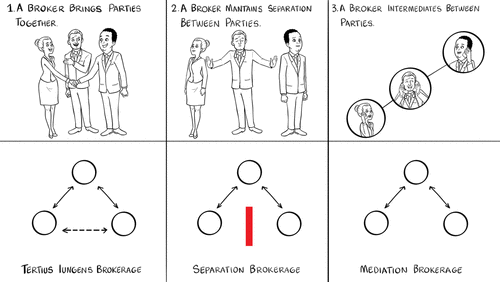
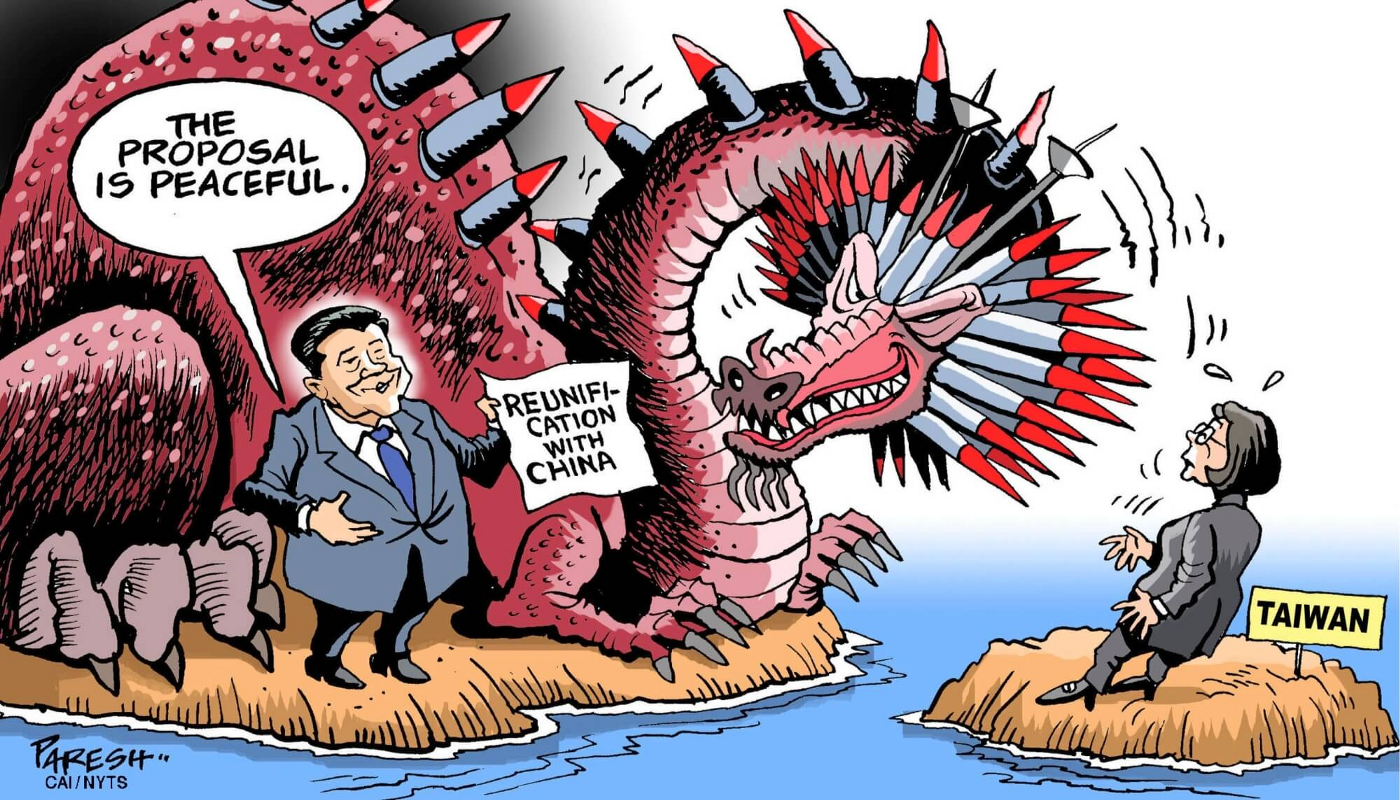 When a dictatorship is in trouble, ten to one that it will seek a way out in the form of war. Judging by China’s increasingly bellicose behavior in respect to Taiwan over the last few weeks, its dictatorship—and, yes, a dictatorship it is—ten to one that it is in deep trouble indeed. Consider:
When a dictatorship is in trouble, ten to one that it will seek a way out in the form of war. Judging by China’s increasingly bellicose behavior in respect to Taiwan over the last few weeks, its dictatorship—and, yes, a dictatorship it is—ten to one that it is in deep trouble indeed. Consider:
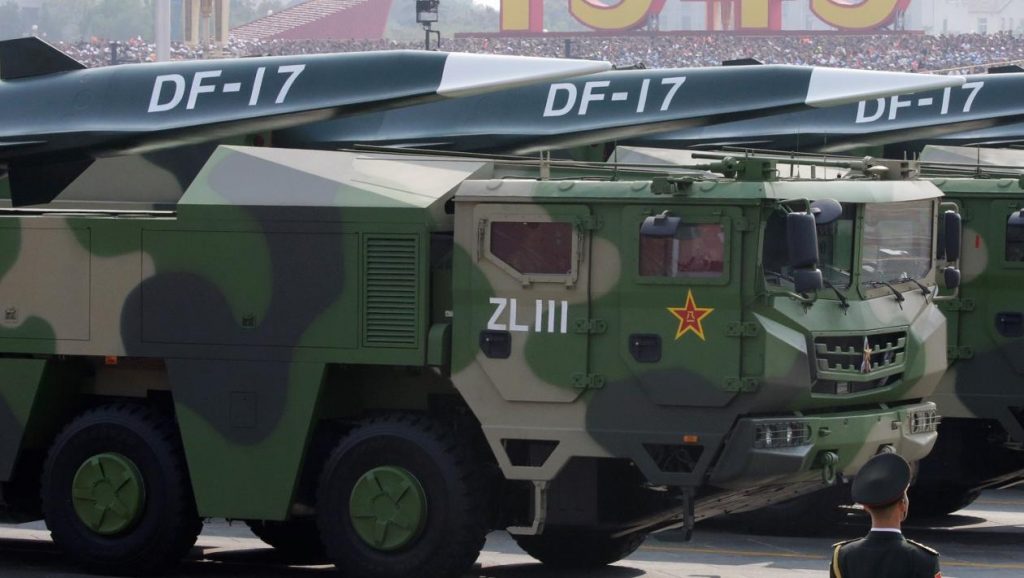 Ever since 1945 peace among the great powers, such as it is, has been guarded above all by nuclear weapons and their delivery vehicles. Weapons so powerful, and so hard to stop on their way to target, that, should they ever be used in any numbers, they can literally put an end to mankind. The balance of terror, as Winston Churchill and others called it.
Ever since 1945 peace among the great powers, such as it is, has been guarded above all by nuclear weapons and their delivery vehicles. Weapons so powerful, and so hard to stop on their way to target, that, should they ever be used in any numbers, they can literally put an end to mankind. The balance of terror, as Winston Churchill and others called it.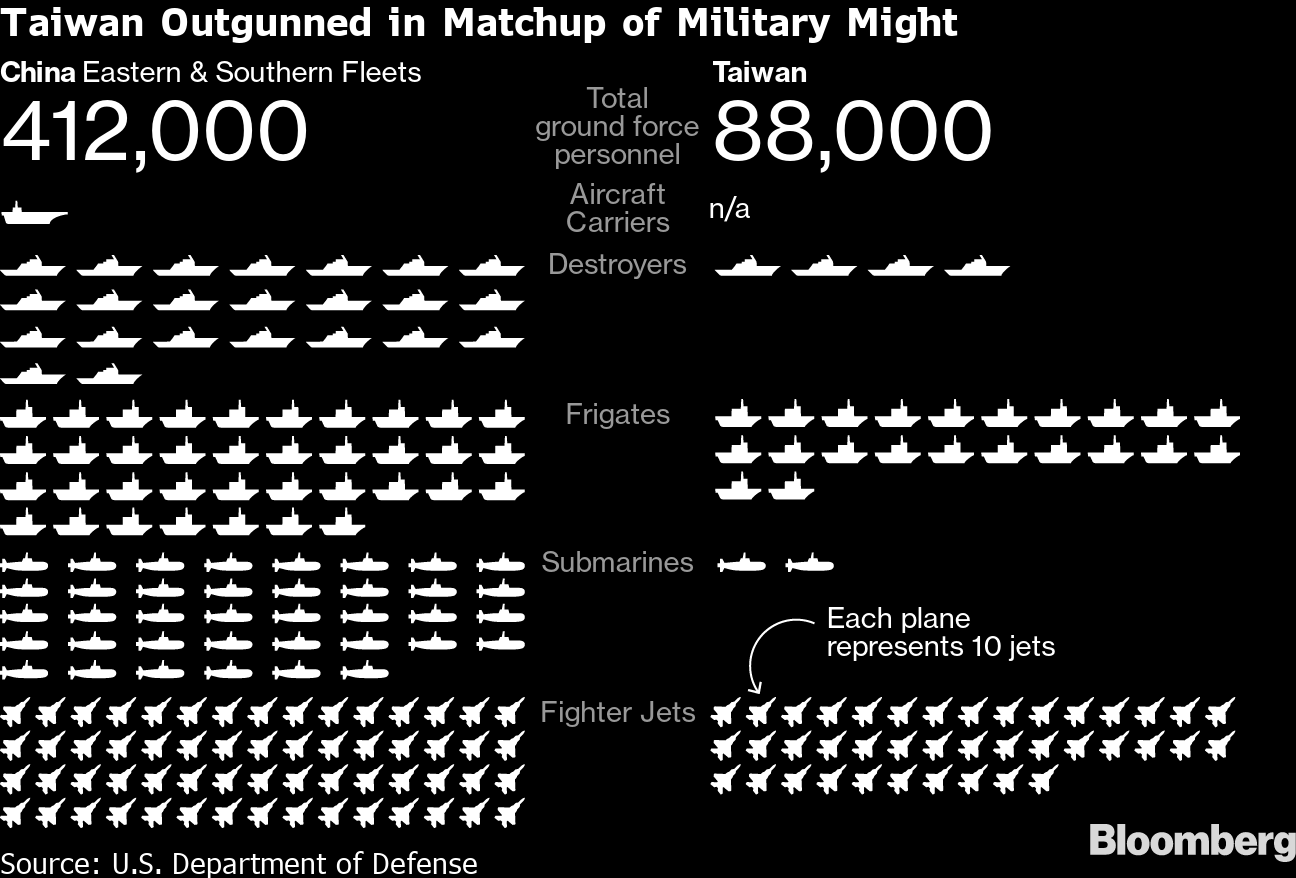 Now that China’s star seems to be on the ascendant and that of the US, following its withdrawal from Afghanistan, on the decline, many people around the world wonder whether a military clash between the two behemoths and their allies is likely. And, if so, how it might come about, what it might look like, and what the outcome might be. The following represents a short attempt to answer these questions.
Now that China’s star seems to be on the ascendant and that of the US, following its withdrawal from Afghanistan, on the decline, many people around the world wonder whether a military clash between the two behemoths and their allies is likely. And, if so, how it might come about, what it might look like, and what the outcome might be. The following represents a short attempt to answer these questions.
